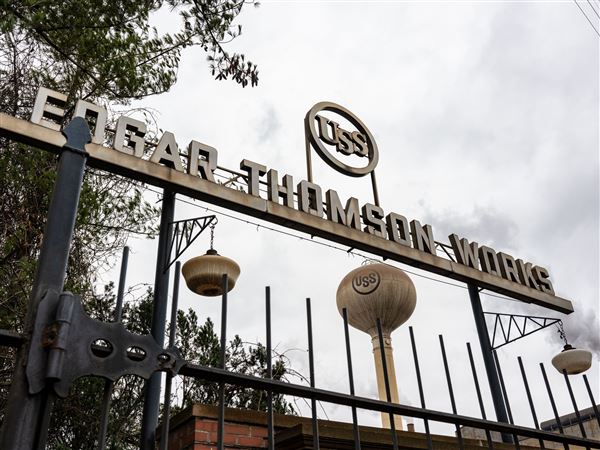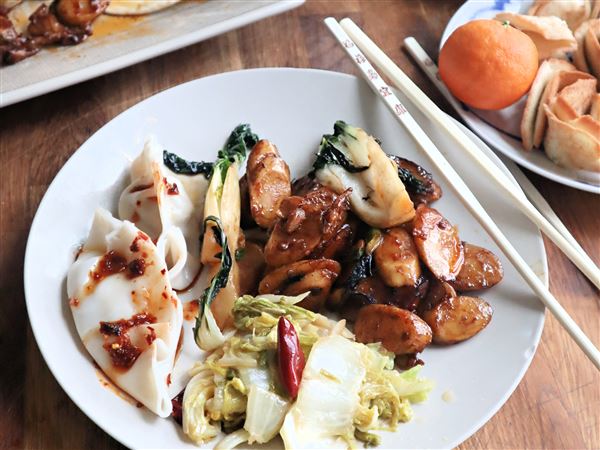Snuggled between a hill and a river, and less than a mile northeast of the gleaming towers of Downtown, Pittsburgh's Strip District offers a ragtag assemblage of buildings along Penn Avenue. From 16th to 23rd streets they appear, one after the other. Butchers and bakers, pizza makers and sandwich purveyors. Italian, Polish and Middle Eastern specialty shops.
It's all here, from prosciutto to pho.
Sylvia McCoy knows and loves each and every one. An elegant blonde, she looks slightly out of place as she leads a walking tour through the stalls and stores. But she has been coming here since she was a little girl, when her Swiss immigrant dad would tow her along as he went hunting for the German treats that reminded him of home.
'Burgh Bits & Bites
1-800-979-3370
Sylvia McCoy and her tour leaders offer several food-oriented tours of Pittsburgh's neighborhoods, including the Strip District, Lawrenceville and Little Italy. The newest tour: Dormont. Public tours start at $35 and meet on various days; reserve ahead.
"That's why so many of these businesses thrived," she says now. "They re-created the old worlds for the men and women who came to live and work here starting around the turn of the 20th century."
She likes to picture the streets crammed with thousands on their way to and from the area's warehouses and railyards and encourages her small group to imagine the smells of sizzling food and the sounds of the Pennsylvania Railroad freight trains roaring past.
It's not that hard: The streets are still bustling, and food is certainly all around, just begging to be tasted.
Down one side street, for example, Ms. McCoy indicates Primanti Brothers, home of the city's signature "everything" sandwich (which is topped with soggy french fries and can include a fried egg, for the extra-brave). "This area was a major center for truckers, railroad workers and produce wholesalers," she says. "Primanti's started as a cart specifically to feed them."
The warehouses still loom above the storefronts and awnings that line the street. A fading sign painted on the side of one reads: "Association for the Improvement of the Poor. Established 1875."
Pausing before a yellow building, Ms. McCoy delves a little more into the lifestyle of the immigrants who once thronged here. "Not too long ago, this was the oldest existing bathhouse in the area," she says. "Now, it's a Thai grocery store."
That the new is always welcome in the Strip District -- so named because it's a sliver of a neighborhood, just a few blocks wide and more than a mile in length -- is further evidenced by the opening of the first new public market to come to Pittsburgh in 45 years. Located in the old Produce Terminal Building, the 10,000-square-foot indoor market now hosts about 30 vendors selling wares from spices to candy.
Nearby, places like the Cigar Factory and the Armstrong Cork Factory have been renovated and turned into condos.
A sign reading "Otto Milk Co." is still visible along the side of one beautiful brick loft conversion, the O's in the name nicely echoing the porthole windows. It's a 1950s remnant of a company that bottled and delivered milk throughout Western Pennsylvania. And the layers go deeper, Ms. McCoy says: The winged figure crouching at one corner at the base of the building's distinctive tower is a reference to the Phoenix Brewery Co., a business that had set up a factory here nearly 100 years earlier.
Condos or not, the area remains authentic and unpretentious. Most of the food businesses have stayed in the same family for decades. The Wholey Fish Market, for example, dates to 1912, and at its current location on Penn Avenue, it features an astounding array of sea creatures in a sprawling building that would nicely serve as an entire farmers market in any other medium-size city.
Next door is Labad's, where coulis and bulgur burst from barrels and hummus and baklava crowd the refrigerated case. Make nice with one of the brothers, Larry or William (the latter's the one sporting the handlebar mustache), and he'll throw in a dried fig or two with your purchases.
Across the street at Parma's, housed in a classic one-story 1950s structure covered in white tile, the Spinabelli family has lined the walls with an international sampling of cooked and house-cured pork, including bratwurst and andouille, kielbasa and mortadella.
Behind the counter, Casey Romig greets Ms. McCoy heartily, then reels off statistics for his visitors. "We sell about 10,000 hams and sausages a week," he says, referring to sales to both walk-ins and wholesale customers. "We carry about 10 different varieties of salami: sopressata, pepperoni, chorizo, you name it," he adds, indicating an array that spreads from mild to spicy, from fine to coarse. Although Mr. Romig is the frontman, the business is owned by the two sons-in-law of Rina Edwards, whose father, Luigi, started Parma's in 1954.
Free samples are part of Ms. McCoy's tour here, as at other places. But if you're on your own, don't be shy about asking.
Sated by the slices of succulent meat we've tasted, we soldier on. Ms. McCoy peers down an alley, then waves for us to follow her. The space opens to reveal a little luncheonette where tourists and businesspeople are scarfing down pizzas, piping hot and straight out of the wood-burning oven from the adjacent bakery, Enrico's.
Before moving on, we pick up some of the bakery's famous biscotti. It offers not only the traditional variety but also ones studded with almonds, apricot, ginger or hazelnuts, to name a few.
The shops continue, each promising temptation inside: pasta, cheese, chocolates. As we walk east, the Strip begins to peter out a bit, but Ms. McCoy still has a few more must-sees on her tour. She leads us to another side street and into Colangelo's, a relatively new bakery with its own specialty, this time a Northern Italian turnover called mele. Bowing to modernity, there's variety here, too, but the apple filling is certainly the best.
In an adjacent room, a barista pumps out espressos while the lunchtime crowd chows down on pasta and salads.
The walk ends with yet another peek at the neighborhood's ethnic heritage at S&D Polish Deli. Here, at last, we sit down -- and are presented with another set of dazzling options. Plump pierogi go for $6.75 a dozen, and you can choose from among potato and cheddar, kraut and mushroom, cabbage or sweeter flavors, such as plum and blueberry.
Some of the others in my group troll the aisles, stocking up on jams and sausage. Me, I sit still and try to savor all the flavors of Pittsburgh that I've enjoyed in the space of one 10-block, two-hour walk.
First Published: August 9, 2012, 8:00 a.m.















